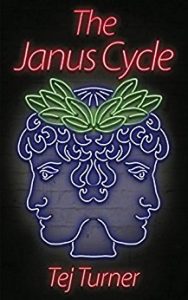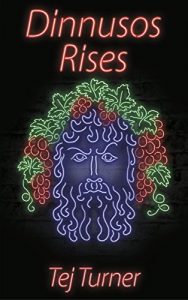“Life is full of objects colliding. Some combine and become saturated in each other, others clash and rebel, some take away little parts from others and move on. It is basic science. Most things come into contact with little effect, but every now and then you will find that right combination and the outcome can be explosive.”
– The Janus Cycle by Tej Turner
 Today I’m going to tell you about two books in a sort-of series (they aren’t technically a series, but they happen in the same universe and there is some overlap) – The Janus Cycle and Dinnusos Rises – that I was introduced to earlier this year. The author, Tej, and his publisher, Elsewhen Press, are both exceedingly cool and easy to work with, which is always a pleasant bonus in the work of reviewing… Because they’re exceedingly cool and easy to work with, this review was a little harder to write than I would have liked. That’s not due to any shortcomings on their part or on the part of either book – rather, it’s because despite being very well-written and edgily entertaining, the books were not my usual fare and I found them a bit, well, grittier than my taste tends to run… As a result, I found one of them (Janus) a little rougher reading, subject matter-wise, than I tend to like, and so didn’t actually finish it, and the second (Dinnusos) was a little confusing feeling as a result of my lack of familiarity with the format and topics/people covered in the first.
Today I’m going to tell you about two books in a sort-of series (they aren’t technically a series, but they happen in the same universe and there is some overlap) – The Janus Cycle and Dinnusos Rises – that I was introduced to earlier this year. The author, Tej, and his publisher, Elsewhen Press, are both exceedingly cool and easy to work with, which is always a pleasant bonus in the work of reviewing… Because they’re exceedingly cool and easy to work with, this review was a little harder to write than I would have liked. That’s not due to any shortcomings on their part or on the part of either book – rather, it’s because despite being very well-written and edgily entertaining, the books were not my usual fare and I found them a bit, well, grittier than my taste tends to run… As a result, I found one of them (Janus) a little rougher reading, subject matter-wise, than I tend to like, and so didn’t actually finish it, and the second (Dinnusos) was a little confusing feeling as a result of my lack of familiarity with the format and topics/people covered in the first.
Weird beginning to a review, no? Trust me, I get it.
Typically, when I haven’t been able to finish a book, I don’t do a review. That’s because I don’t usually have anything to say about a book I couldn’t get deep enough into to slog through – unless, of course, the book was *SO* bad that I feel like I have to warn people about it. Fortunately, that doesn’t happen very often. The advent of increased computer literacy and the availability of such useful tools as online editorial and style services means that it is increasingly rare to run into something that is so unfinished or raw  or rough that it warrants a warning. Instead, most books I don’t finish fall soundly into the “I couldn’t get into it, there’s really nothing wrong with it per se, it just wasn’t for me” category – and there really isn’t much to say beyond that… Sure, I could mouth a few platitudes, but that doesn’t make for very exciting reading by you – or writing by me. Every now and again, though, I stumble on something that I think really is a cool concept or story, written by a very talented person, that just happens to fall outside my wheelhouse. Then, I feel compelled to write a review, because to simply see that I gave it a mediocre three stars just doesn’t cut it – it doesn’t do justice to the author OR story that they receive a lukewarm review simply because I picked up a book outside of my comfort zone and it delivered what it promised, namely a story that I wasn’t exactly comfortable launching myself into.
or rough that it warrants a warning. Instead, most books I don’t finish fall soundly into the “I couldn’t get into it, there’s really nothing wrong with it per se, it just wasn’t for me” category – and there really isn’t much to say beyond that… Sure, I could mouth a few platitudes, but that doesn’t make for very exciting reading by you – or writing by me. Every now and again, though, I stumble on something that I think really is a cool concept or story, written by a very talented person, that just happens to fall outside my wheelhouse. Then, I feel compelled to write a review, because to simply see that I gave it a mediocre three stars just doesn’t cut it – it doesn’t do justice to the author OR story that they receive a lukewarm review simply because I picked up a book outside of my comfort zone and it delivered what it promised, namely a story that I wasn’t exactly comfortable launching myself into.
These are those books.
The first book, Janus, was rougher going for me. The storytelling style in these books is chapter-by-chapter perspective shift. You aren’t introduced to the character who is currently narrating. You aren’t given any backstory or hints; you learn by doing. As the narrative progresses, you get glimpses of where you are and why you’re there, but there’s a certain amount of flexibility in the style that I struggled with a bit. I tend to prefer my novels in a more traditional format – I’m a bit old-school in that regard. These are more like short stories, and that is a format I don’t always love. I like a slow-build, with lots of backstory and complicated, well-developed, characters. Janus has the latter in spades – the patrons of the club are certainly complex individuals, even when their behavior feels stereotypical (drugs, drinking, sex). But therein lied some of the issues I ran up against, since I don’t tend to love stories about decadence and self-indulgence. It may be that if I’d stuck with it longer, I would have found the thread that tied it all together in a way that made the stories about more than gluttony of one type or another, but I simply couldn’t get there. That’s not a failing of the stories; they are told well, and there are clearly layers to the characters, but I got a bit lost in the over-indulging and the perspective shifts…
The second book, Dinnusos, was more my style. This one has magical elements, and the characters (and therefore narratives) seemed more immediately interconnected. There was also less of the “sex, drugs, rock-and-roll” culture, which is ironic, since it opens with rock-and-roll… I still had difficulty with the shifting perspectives though. I was actually asked to review this book first; I wound up contacting the author/publisher to request the first book, because I assumed I was feeling lost in the characters because I hadn’t read the earlier installment. Turns out, I wasn’t – the first book parallels the universe in the second, and there is some overlap, but my read of it did nothing to help me feel more comfortable in the world of Dinnusos. Perhaps that’s part of the point though – this isn’t a comfort book, and I think stepping outside of my comfort zone is where I ran into issues with them. That’s me, not the books. The characters in Dinnusos (I got much farther in this one) are intriguing – many of them are young, and their immersion in the club world was colorfully presented without ever feeling either over- or under-done. Turner manages a tidy turn of phrase in his descriptions of people and their emotional baggage – there are some cleverly massaged psychological insights here, and those were fun to discover. While I doubt I’ll undergo a Janus revival, Dinnusos is on my “come back to” list… There are elements described in the blurb that are vastly intriguing (the mythology components, especially) and I do want to see how they play out, even if they didn’t do so in a perfect fit for me right now. The writing is strong, as is the characterization, so it’s definitely worth revisiting when I’m in a different mindset.
Tej Turner is a very talented individual. He uses language to paint evocative pictures and portray lives and personalities in an incredibly living-color fashion that punches you in the face – in the best way. This isn’t timid reading, it’s full-frontal, Gonzo storytelling. The concept of “gritty urban realism” is being sadly overplayed in the media, but that’s exactly what this is. The edges are rough, the players are flawed, the stories are occasionally wince-inducingly real. That’s not how I would describe my typical reading taste, in any way, shape or form. So these books were not exactly for me. But they were very well crafted and the characters are deeply human for good and for ill. And on top of that, the cover illustrations are extremely cool, aren’t they?


 Jill-Elizabeth LinkedIn
Jill-Elizabeth LinkedIn



Leave a Reply